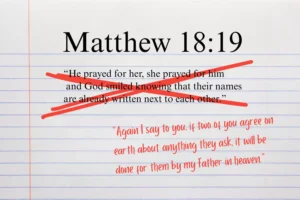I first met Mandisa over breakfast in the fall of 2020. I had landed the job of helping her write her memoir, “Out of the Dark,” and I was incredibly nervous. She immediately put me at ease with her megawatt smile and jocular personality. She was friendly and personable with our server (who had no idea who she was), talked incessantly about her Tennessee Titans football team, and pulled out her phone to show me pictures of her Havanese puppy, Kiya. (“When I met her, she lifted up her little paws and I said, ‘She’s a praise puppy!’”)
Over the next two days, I heard Mandisa’s incredible account of her life. I discovered that she had experienced a lot of tragedy, including the death of her best friend, Kisha, in 2014. Though I saw her as a contemporary Christian music superstar, she didn’t feel like a success. She seemed unaware of the thousands of people she had inspired, both in her personal life and through radio anthems like “Stronger” and “Overcomer.”
As a fan of her music, I had mostly observed her highs — forgiving Simon Cowell on national television during season five of “American Idol,” having multiple number one songs on the radio, and winning a Grammy for best album. But I discovered Mandisa had also traversed many valleys: losing her friend, battling depression and food addiction, and grappling with the isolation of a global pandemic.
Unexpected homegoing
On April 18, 2024, Mandisa passed away unexpectedly at the age of 47. Her death shocked her family, friends, and the world. No one imagined that vibrant voice and larger-than-life personality would leave this earth so soon. Over the past few weeks, as I have reflected on my time with Mandisa and the experience of helping her write her book, I have contemplated many things I learned through her example. While I could name a dozen, here are my top three:
God uses those who struggle. Mandisa’s story had ups and downs. She was predicted to be the winner of “American Idol” season five but ended up in ninth place. She lost 100 pounds and gained it all back. She lost her best friend to cancer. She testified that God had brought her “out of the dark,” and yet she fought daily to stay in the light of God’s truth. Her struggles did not stop her from speaking out about her big God; in fact, she used her weakness as a platform to proclaim His strength.
Through her example, I learned that those who struggle can still be used powerfully by God. In the early days of the pandemic, Mandisa was active on social media, using “Mornings with Mandisa” to encourage those feeling isolated. She also recorded the “Out of the Dark” podcast to discuss issues of mental health. The music she released in recent years encouraged thousands. Amid her own emotional struggles, she reached out to people and offered them hope. As I helped Mandisa write about her life, I saw clearly how God had used her as His instrument even in her darkest days.
God invites us to have a real relationship with Him. I quickly discovered Mandisa was a woman of the Word. She quoted an impressive amount of Scripture, but in particular, she repeatedly quoted the Psalms. She resonated with David’s honest questions and “temper tantrums” with God. She admitted to having “spicy” conversations with the Lord after Kisha, a young mother of two, passed away from cancer. She voiced these sentiments in her song “Prove Me Wrong.” And yet amid her questions and doubts, her faith remained solid.
Mandisa taught me that true healing occurs when we can be honest with God while still acknowledging His goodness and sovereignty. He is our best help in time of trouble. In her pain, Mandisa had raw conversations with Jesus, but she also took shelter in His love. And she loved Him deeply in return. It was the fruit of her consistent, authentic — sometimes hard-fought — relationship with Him.
We need other people in our lives. I interviewed Mandisa in 2020 when most of the world was feeling isolated and disconnected during a pandemic. A theme that came up repeatedly was the necessity of community. As a single woman, Mandisa had discovered that her community was critical to her mental, emotional and spiritual health. At one point, when she had been in a season of deep depression, her community stepped in and made it clear they would not let her go. She was not alone. They urged her to seek professional help, which she did.
“We need each other,” she told me. “The enemy wants to divide us and isolate us — but that’s where he gets a foothold. God does beautiful things in the context of community.” During the livestream of her celebration of life, which lasted over three hours, I heard each of those inner-circle friends talk about what Mandisa had meant to them — how she had changed their lives and inspired them.
Choosing to praise
It’s been over three years since I spent time with Mandisa, unearthing her life story. I have the funny memories — like when I DoorDashed us sushi for lunch, but accidentally had it delivered to the house across the street. She laughed uproariously as we retrieved the food from her neighbor’s porch, wondering what they would think when they checked their Ring camera. And she couldn’t stop talking about how much she loved “The Chosen” TV series, even gifting me with a set of the DVDs.
The lighthearted moments mingled with her somber reflections on the pain she’d experienced in her life … and the ways God had been good. Since our interviews, I’ve walked through several dark valleys of my own, and I’ve thought about Mandisa’s example of praising God through the pain.
“Anytime I hit a valley in my life, I have a choice,” she wrote in her memoir. “I can pull away from God or I can choose to praise him. Praise is powerful because it reminds me of who is really in charge, the Lord Most High, who is both just and good.” At her concerts, she would often exhort, “Don’t wait until the battle is over. Praise Him right now!” She understood how praise is a weapon that helps us overcome life’s challenges.
At the “American Idol” tribute, fellow “Idol” alums Colton Dixon, Melinda Doolittle and Danny Gokey sang “Shackles (Praise You),” a song Mandisa performed in 2006 on the “American Idol” stage. After the song, Dixon summed up his feelings about his friend. “I think she came in praising; I think she left praising. We’re going to miss her … but our loss is heaven’s gain.” I couldn’t agree more. Thank you, Mandisa, for teaching us the power of praise.
Copyright 2024 Suzanne Hadley Gosselin. All rights reserved.











